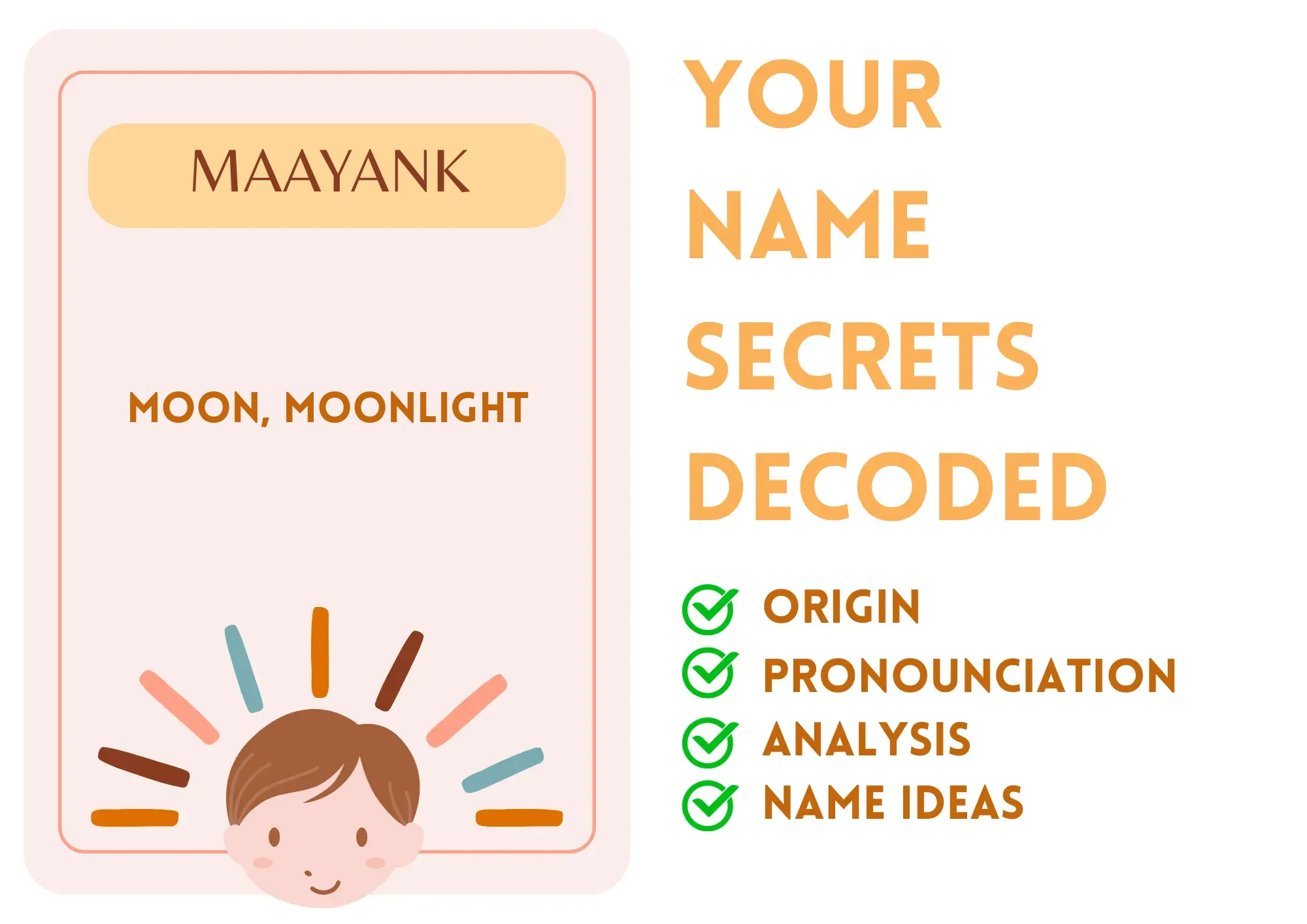
Maayank
Maayank is a unique and meaningful name of Sanskrit origin, translating to 'moon' or 'moonlight.' This name is primarily used in India and among Indian communities, recognized as a masculine name. In Hindu culture, the moon symbolizes calmness, beauty, and the cyclical nature of life, making it a significant astrological presence.
Perceived as serene and poetic, Maayank evokes feelings of tranquility and charm. It is easy to write and pronounce, with common nicknames such as Maa and Yank.
The name appears in various cultural contexts, celebrated for its association with the moon, and is considered auspicious for children born during the night, reflecting their connection to lunar qualities.
Basic Information
Gender: Boy
Sounds Like: MAH-yank
Pronunciation Explanation: The emphasis is on the first syllable 'MAH', pronounced like 'ma' in 'mama', followed by 'yank', which rhymes with 'tank'.
Summary and Meaning
Meaning: moon, moonlight
Origin: The name Maayank has Indian origins, coming from the rich tapestry of Hindu traditions and the Sanskrit language.
Usage: Traditionally, Maayank is a masculine name, though its lyrical quality gives it a poetic fluidity that can appeal to unisex interpretations.
Name Number (Chaldean)
Name Number (Pythagorean)
Name Constellation (Nakshatra)
Name Zodiac Sign (Rashi)
Popularity (Global Rank)
Overall: 300900
Boys: 54235
Most Popular in
Religious and Cultural Significance
Religion: Hindu
Background: In Hindu culture, the moon holds significant spiritual importance, often associated with calmness, nourishment, and the mind. It reflects the beauty and cycles of life.
Cultural Significance: Maayank is appreciated for its calming associations and is often chosen for boys born under lunar signs or for those who have a strong connection to night symbolism.
Historical Significance: The concept of the moon has historical prominence in Hindu astrology and texts, symbolizing emotions, intuition, and nurturing qualities. The name Maayank embodies these ideals.
Popular Culture
Literature and Mythology: The name Maayank carries literary and poetic connotations, found in various poems referring to the beauty of the moon.
Movies and Television: While not frequently used as a character name in popular films, it resonates strongly in poetic cinema where nature and emotions play central roles.
Feelings and Perceptions
Perception: Maayank is generally perceived positively, evoking thoughts of serenity and beauty associated with the moon. It is seen as a unique and elegant choice.
Positive Feelings: Calm, poetic, unique, serene, beautiful, elegant.
Negative Feelings: Might be considered uncommon or difficult to spell/pronounce for some.
Practical Considerations
Ease of Writing and Calling: Maayank is relatively straightforward to write and pronounce, consisting of six letters and two syllables, making it easy to remember.
Common Typos and Misspellings: Maaynk,Maayankk,Mayank,Mayankk
Common Nicknames: Maa,Yank,Miki
Maayank Popularity
Maayank Usage and Popularity By Country
| Country | Rank (Overall) |
|---|---|
| India | 59736 |
| Australia | 105589 |
Maayank Usage and Popularity By City
| City | Rank (Overall) |
|---|---|
| Bombay | 18432 |
| New Delhi | 11476 |
Compatibility Analysis
Famous Persons Named Maayank
No results found for Maayank.
Related Names
Similar Sounding Names:
Mayank,Aayank,Maanik,Maayan
Similar Meaning and Related Names:
Sibling Name Ideas (Brothers):
Sibling Name Ideas (Sisters):
Ira ♀️
Hindu, Irish, Jewish